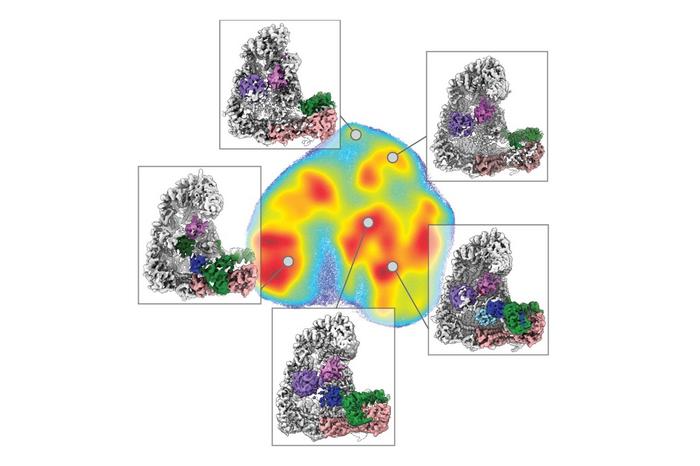Within the intricate molecular landscape inside of a cell, the orchestration of proteins demands precise control to avoid disease. While some proteins must be synthesised at specific times, others require timely breakdown and recycling. Protein degradation is a fundamental process that influences cellular activities such as the cell cycle, cell death, or immune response. At the core of this process lies the proteasome, a recycling hub in the cell. The proteasome degrades proteins if they carry a molecular tag formed by a chain of ubiquitin molecules. The task of attaching this tag falls to enzymes known as ubiquitin ligases.

Credit: Brown, Haselbach et al
Within the intricate molecular landscape inside of a cell, the orchestration of proteins demands precise control to avoid disease. While some proteins must be synthesised at specific times, others require timely breakdown and recycling. Protein degradation is a fundamental process that influences cellular activities such as the cell cycle, cell death, or immune response. At the core of this process lies the proteasome, a recycling hub in the cell. The proteasome degrades proteins if they carry a molecular tag formed by a chain of ubiquitin molecules. The task of attaching this tag falls to enzymes known as ubiquitin ligases.
This process, known as polyubiquitination, has long been difficult to study due to its rapid and complex nature. To tackle this challenge, scientists at the Research Institute of Molecular Biology (IMP) in Vienna, the University of North Carolina School of Medicine, and collaborators employed a combination of techniques, integrating cryo-electron microscopy (cryo-EM) with cutting-edge deep learning algorithms. David Haselbach, PhD, a group leader at the IMP, said, “Our aim was to capture polyubiquitination step by step through time-resolved cryo-EM studies. This method allowed us to visualize and dissect the intricate molecular interactions that take place during this process, like in a stop motion movie.”
A biochemical timelapse
The study, published in the journal Nature Structural and Molecular Biology, delves into the movements of the Anaphase-Promoting Complex/Cyclosome (APC/C), a ubiquitin ligase that drives the cell cycle. The mechanics behind APC/C’s attaching of a ubiquitin signal remained an unsolved puzzle. Haselbach and Nicholas Brown, PhD, associate professor of pharmacology at the University of North Carolina School of Medicine, are co-senior authors.
“We had a solid grasp of APC/C’s fundamental structure, a prerequisite for time-resolved cryo-EM,” said first author Tatyana Bodrug, PhD, a postdoctoral pharmacology researcher at UNC-Chapel Hill. “Now we have a much better understanding of its function, every step of the way.”
Ubiquitin ligases perform many tasks, including recruiting different substrates, interacting with other enzymes, and forming different types of ubiquitin signals. The scientists visualized interactions between ubiquitin-linked proteins and APC/C and its co-enzymes. They reconstructed the movements undergone by APC/C during polyubiquitination using a form of deep learning called neural networks. This was a first in protein degradation research.
The APC/C is a part of the large family of ubiquitin ligases (more than 600 members) that have yet to be characterized in this manner. Global efforts will keep pushing the boundaries of this field.
“A key to the success of our work was collaboration with several other teams,” said Brown, also a member of the UNC Lineberger Comprehensive Cancer Center. “At Princeton University, Ellen Zhong’s software and programming contributions were key to uncovering new insights about the APC/C mechanism. Subsequent validation of these findings required the help of several other groups led by Drs Harrison, Steimel, Hahn, Emanuele, and Zhang. “A team effort was crucial to push our research over the finish line.”
The significance of this research extends beyond its immediate impact, paving the way for future explorations into the regulation of ligases, ultimately promising deeper insights into the mechanisms underpinning protein metabolism important for human health and diseases, such as many forms of cancer.
Written by Mehdi Khadraoui, communications officer at the Research Institute of Molecular Pathology (IMP), part of the Vienna BioCenter. UNC School of Medicine contact is Mark Derewicz, director of research and national news.
DOI
10.1038/s41594-023-01105-5
Method of Research
Experimental study
Subject of Research
Cells




